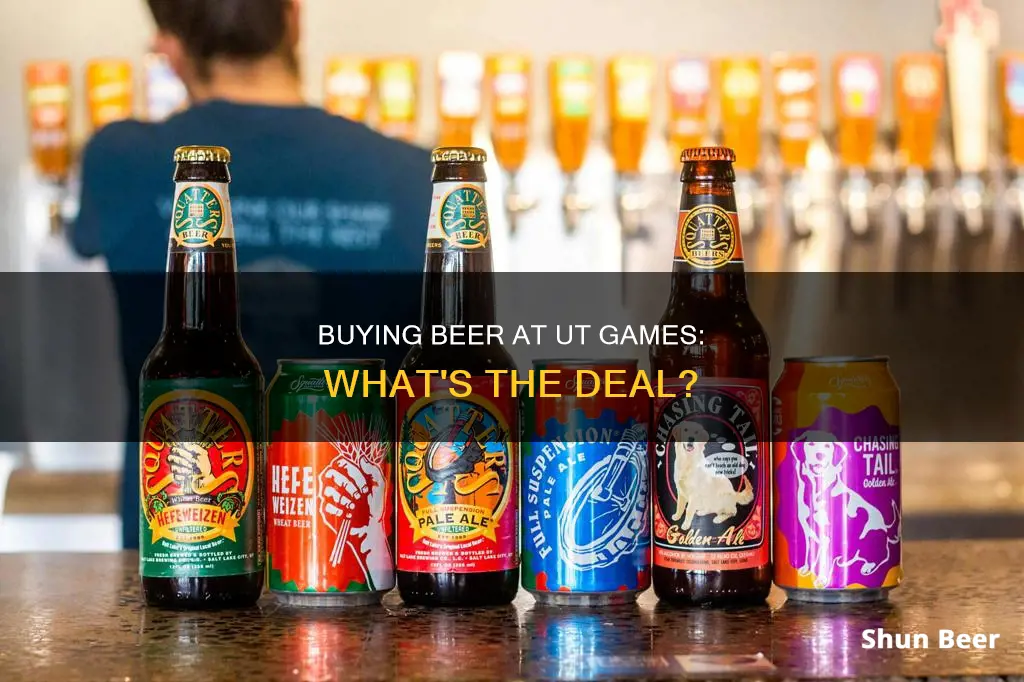
Beer and wine are now available for purchase at University of Texas (UT) football games, marking a significant shift in the school's history. This decision, which took effect on September 12, 2015, is primarily economically motivated, with the expectation that it will boost the university's revenue. The availability of alcohol at college football games is a recent development, and UT is not alone in this move, with 88% of FBS schools selling alcohol during the 2023 season. However, there are concerns about the potential impact on fan behaviour and safety, especially with drunk driving incidents. Despite these worries, UT officials maintain that the sale of alcohol is a common aspect of major athletic events and that it enhances the fan experience.
| Characteristics | Values |
|---|---|
| Alcohol availability at UT games | Beer and wine are available for purchase at UT games |
| Alcohol type | Alcoholic beverages, but not hard liquor |
| Alcohol price range | $8 to $10 |
| Alcohol cut-off time | After the third quarter |
| Alcohol sales revenue | $1.25 million in the 2015 season |
| Alcohol-related arrests | No increase in arrests reported by officials |
| Alcohol-related police calls | 65 more calls during the first three home games in 2015 compared to previous years |
| Stadium | Darrell K. Royal-Texas Memorial Stadium |
What You'll Learn

Beer and wine are available at UT football games
UT first started testing the sale of alcoholic beverages at baseball and basketball games in 2014, which was met with positive results. Texas Athletics officials and the Texas Alcohol Beverage Commission (TABC) agreed that the sales had been a "positive from a safety, community impact, and fan experience standpoint". UT President Greg Fenves supported the decision, stating that the university has "very devoted fans" and that being able to "serve beer to them is part of that experience".
However, the introduction of alcohol sales at UT football games was met with some concern. Some worried that it would lead to rowdy and obnoxious behavior, and that binge drinking before games and at halftime would increase. While there has been no increase in arrests, there were 65 more calls to the police during the 2016 football season compared to previous years. It is unclear what role, if any, alcohol played in these arrests and police calls.
Despite the initial concerns, UT joined a growing list of colleges that sell alcoholic beverages at their premiere sports events. Beer and wine prices range from $8 to $10, and sales are cut off after the third quarter.
Buying Beer After Midnight in FoCo: Where to Go?
You may want to see also

Beer sales at college football games are increasing
One of the main reasons for this increase is economic: colleges can boost their revenue by selling beer and wine at games. The University of North Carolina, for example, made about $4 million in sales. Texas A&M health behaviour social scientist Adam Barry notes that after the SEC allowed schools to sell alcohol in 2019, “booze started to flow in stadiums from coast to coast”.
UT-Austin, or the University of Texas, approved the sale of beer and wine at football games in 2015, citing positive results from alcohol sales at baseball and basketball games. The University of Texas police said that they would continue to strive to create a safe and positive experience for fans.
While there are concerns about the impact of alcohol sales on fan safety and drunk driving incidents, a study at a large Midwestern university found that in-stadium alcohol sales had no significant impact on the frequency or proportion of alcohol-related emergency department visits. The study also found a decrease in alcohol-related EMS calls on home game days.
Thanksgiving Beer Run: Indiana's Alcohol Sales Rules Explained
You may want to see also

Alcohol availability at games may reduce binge drinking
The availability of alcohol at games has been a topic of debate, with some arguing that it may lead to increased rowdiness and negative impacts on the overall experience for fans. However, there is evidence to suggest that alcohol availability at games may actually help reduce binge drinking.
The University of Texas (UT) started offering beer and wine at its football games in 2015, marking a significant change for the university. While some were concerned about the potential for negative consequences, the decision was primarily driven by economic factors and the expectation that it would boost the school's revenue. UT officials also believed that it would be well-received by devoted fans, enhancing their game-day experience.
Despite initial worries, the introduction of alcohol sales at UT football games did not lead to an increase in arrests or criminal activity. In fact, an analysis of three home games during the season showed a decrease in arrests compared to previous years. While the number of calls to the police did increase, it is unclear if alcohol played a role in these calls. UT Police Chief David Carter emphasized that each game has its own unique atmosphere and that it is too early to draw conclusions about the impact of alcohol sales.
Interestingly, the availability of alcohol at UT football games seems to have had a positive impact on binge drinking behaviors. Anecdotal evidence suggests that serving alcohol inside the stadium may curb binge drinking before games and during halftime, as fans no longer feel the need to exit the stadium to engage in alcohol-fueled tailgating. Additionally, stadium servers are trained to recognize when someone has had too much to drink, allowing them to intervene if necessary.
The experience of other universities supports the idea that alcohol availability at games can reduce binge drinking. For example, West Virginia University, which started selling alcohol in 2011, saw a decrease in police calls, arrests, and charges in the following year. Their police chief, Bob Roberts, attributed this success to several initiatives, including educating fans on proper behavior and enforcing rules like the "no pass-out" policy.
In conclusion, while there are valid concerns about the potential negative consequences of alcohol availability at games, the experience of universities like UT and West Virginia suggests that it may actually help reduce binge drinking. By providing a controlled environment for fans to consume alcohol and implementing effective policies, universities can strike a balance between enhancing the fan experience and promoting responsible drinking.
Kozel Beer: Is It Available in the US Market?
You may want to see also

Drunk driving incidents may increase with beer sales
The sale of beer at college football games has become increasingly common, with 88% of FBS schools selling alcohol during the 2023 season. This shift has sparked concerns about the potential impact on drunk driving incidents, particularly when combined with the rowdy nature of football games.
Drunk driving is a significant issue in the United States, claiming the lives of approximately 37 people each day, which equates to a fatality every 39 minutes. This results in an average of 11,000 deaths per year due to drunk driving crashes. The issue predominantly affects young people, with drivers aged 21-24 accounting for the highest percentage of fatal alcohol-impaired crashes.
The University of Texas' decision to sell alcohol at football games has brought these concerns to the forefront. Data from UT police and the Texas Department of Transportation indicates that the number of crashes on game days is higher than on non-game days. For instance, in 2013, there was a 5% increase in crashes on football game days compared to the previous year.
While the university acknowledges the potential safety risks, the decision to sell alcohol is primarily driven by economic factors. The sale of beer and wine at baseball and basketball games has boosted revenue and been deemed a "positive from a safety, community impact, and fan experience standpoint."
To mitigate the potential increase in drunk driving incidents, law enforcement agencies employ various strategies, such as sobriety checkpoints and high-visibility saturation patrols. Additionally, ignition interlock devices, which require drivers to provide a breath sample before starting their vehicle, have proven effective in reducing drunk driving fatalities.
While the full impact of beer sales at UT games on drunk driving incidents remains to be seen, it is crucial for attendees to prioritize safety. Drinking and driving not only poses a legal risk but also endangers the driver's life and the lives of others. Planning alternative transportation methods, such as designating a sober driver or using a rideshare service, is essential to preventing drunk driving incidents.
Buying Beer Late at Night: What's the Legal Limit?
You may want to see also

Beer sales at UT games are for economic reasons
Beer sales at University of Texas (UT) football games are primarily driven by economic reasons. The decision to sell beer and wine at UT football games was made in 2015, with the first sales taking place during the 2015 season. This decision was made by Texas Athletics officials and the Texas Alcohol Beverage Commission, who cited economic benefits as a key factor. The sales of alcohol at baseball and basketball games had already proven successful, and it was believed that this would translate to football games as well.
UT President Greg Fenves supported the decision, stating that the ability to serve beer was part of providing a "high-quality experience" for fans. Indeed, the sales of beer and wine have generated significant revenue for UT, with $1.25 million in revenue generated during the 2016 season alone. This revenue helps support numerous men's and women's varsity sports at the university.
In addition to the economic benefits, the decision to sell beer and wine at UT football games was also influenced by the desire to curb binge drinking before games and at halftime. It was believed that allowing fans to purchase alcohol inside the stadium would reduce the amount of alcohol consumed during tailgating activities. While there have been concerns about rowdy behavior and increased arrests, officials have reported no significant change in the number of incidents occurring during games.
The availability of beer and wine at UT football games brings the university in line with a growing trend among colleges to sell alcoholic beverages at their premiere sporting events. This trend reflects a shift in the culture and expectations of fans, who now consider the ability to purchase alcohol as part of the standard "fan experience". Overall, the decision to sell beer and wine at UT football games is largely driven by economic considerations, with the potential to boost revenue and support varsity sports, while also addressing concerns related to binge drinking and fan experience.
Buying Beer in Mississippi: Legal Hours and Availability
You may want to see also
Frequently asked questions
Yes, the University of Texas (UT) sells beer and wine at football games.
UT started selling beer and wine at football games in 2015.
The decision to sell beer at games was primarily economic and is expected to boost the school's revenue.
Beer prices range from $8 to $10.







